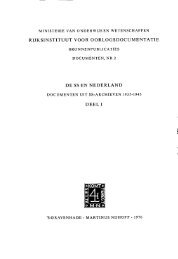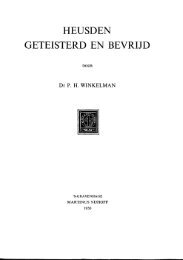De razzia van Rotterdam. 10-11 november 1944 - KNAW
De razzia van Rotterdam. 10-11 november 1944 - KNAW
De razzia van Rotterdam. 10-11 november 1944 - KNAW
You also want an ePaper? Increase the reach of your titles
YUMPU automatically turns print PDFs into web optimized ePapers that Google loves.
264 SUMMARY<br />
deported; also with Germans imprisoned in the Netherlands. The data thus gained<br />
were compared with letters, diaries, notes for diaries and documents available at the<br />
Institute.<br />
One problem was the extent to which the men interviewed might give a false picture<br />
of the events as a result of the influence exerted by the interviewer. The author<br />
believes this factor to be of little importance. His starting point was material received<br />
as a result of publications in the <strong>Rotterdam</strong> press, which had not been influenced by<br />
the author. Moreover, in carrying out the interviews care was taken to let the man<br />
interviewed speak his mind freely.<br />
In arranging the interviews a choice had to be made from thousands of people<br />
whose lives had been afïected by the <strong>razzia</strong>. In making the choice an attempt was<br />
made to interview as many people as possible of different occupations, religions, and<br />
age. The interviews were, of course, hampered by the fact that they were held five<br />
years after the <strong>razzia</strong>. Many details were not remembered, and the nature of people’s<br />
characters determines what they remember and how. In many cases, however, the<br />
author was able to assist the man interviewed with his knowledge of analogous<br />
situations. This knowledge enabled him also to determine the value of each person’s<br />
communication.<br />
One year after the research began a large amount of material had been collected.<br />
It had been made available by 250 people. This was but a small percentage of the<br />
total number of men deported. It was therefore decided to distribute questionnaires.<br />
By this means many more people could be approached. The result of the questionnaire,<br />
however, is not entirely satisfactory. The questions have to be short, and the answers<br />
are usually brief also. The man who fills in a questionnaire can only give answers<br />
to specific questions, he has no chance to give free rein to the thought associations<br />
in his mind. Similarly the author is unable to ask for further information when the<br />
answer is not entirely clear or to explain a question which has not been properly<br />
understood. Finally, he is unable to study the man supplying the data. In many cases<br />
this would be of obvious importance. The author for example tried to determine<br />
how the men feit, while they were in the holds of the ships in which they were trans-<br />
ported from <strong>Rotterdam</strong>. A man of a melancholy nature might have said they “feit<br />
fine”, whilst a man of sanguinary temperament might have answered “as usual” .<br />
In cases like this the interview has ad<strong>van</strong>tages over the questionnaire.<br />
The questionnaires, nevertheless, formed an invaluable link. The event studied was<br />
of a mass nature. The data collected from a relatively small number of witnesses had<br />
to be supplemented and controlled by making use of many more reports. In order<br />
to facilitate control the questionnaire included certain questions which had also been<br />
used during the interviews, such as: what motives determined the witness concerned<br />
to obey or not to obey the German order? Were there any machine-guns or other<br />
weapons installed in the streets or in the squares? What was the behaviour of the<br />
Germans like in searching the houses or during the marches through the town? How<br />
did the men feel during transport?






